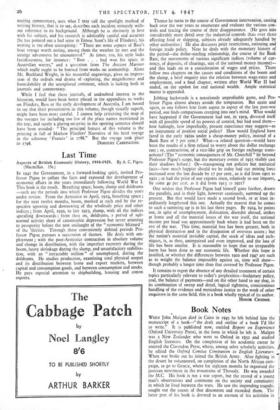Book Notes .
WHEN John Mulgan died in Cairo in 1945 he left behind him the manuscript of a book—" the draft and outline of a book I'd like to write." It is published now, entitled Report on Experience (Oxford University Press), in the form in which he left it. Mulgan was a New Zealander who went to Oxford in 1932 and studied English literature. On the completion of his academic career he entered the Clarendon Press, where, among other scholarly activities, he edited the Oxford Concise Companion to English Literature. When war broke out he joined the British Army. After fighting in the desert he volunteered, on completion of the North African cam- paign, to go to Greece, where for eighteen months he organised the partisan movement in the mountains of Thessaly. He was awarded the M.C. His book is not a war report, but the record of a young man's observations and comments on the society and community in which he lived between the wars. He saw the impending tragedy, sought out the causes of that discontent and recorded them. The latter part of his book is devoted to an account of his activities in
Thessaly and to a Greece.
* Jacqueline Chittenden and Charles Seltman were the organisers and directors of the Exhibition of Greek Art at the Royal Academy in 1946, which was considered one of the finest exhibitions of its kind ever held in England. Now they are publishing a commemora- tive catalogue entitled Greek Art, which contains a fresh introduction and 128 plates portraying over 200 of the loans that were on exhibi- tion. The majority of the works illustrated are of the archai:, classical and Byzantine periods, but the book as a whole epitomises Greek art from about 3,000 B.c. down to the present day. Faber's are the publishers.
* * * * Dr. E. M. W. Tillyard, Master of Jesus College, Cambridge, and an authority on Milton, has undertaken an interesting experiment in literary criticism. He has taken five poems written at intervals of about a century and examined them in detail both from the point of view of their inherent poetic worth and the contemporary " mental climate " which they reflect. By frequent cross-reference he has succeeded in relating each poem to the others. The poems are Henryson's The Testament of Cresseid, Sir John Davies' Orchestra, Dryden's Ode on Anne Killigrew, Coleridge's The Rime of the Ancient Mariner and Swinburne's Hertha. Among Dr. Tillyard's conclusions is the suggestic.n that Hertha foreshadowed the doctrines of Fascism. The book will be published shortly by Chatto and Windus.
* * * * Longman's are publishing on July 7th Human Destiny, a work by the French physicist, Lecomte du Noiiy. It is a reinterpretation of the theory of evolution in the light of modern physics, synthesising modern scientific knowledge with the Christian faith. By a study of the history of life from its murky beginnings Dr. du Noily is confident in discounting the materialistic view of the universe. Indeed, he deduces a spiritual purpose in the evolution of man, and reasserts the belief in the existence of God and free will and the individual. The book was published earlier in the year in America.
* *
The Rape of Lucretia, edited by Eric Crozier and with a fore- word by Benjamin Britten, is a volume which commemorates the Glyndebourne production of the opera. The list of contributors is
• short but authoritative. The composer's foreword is followed by an introductory essay from Eric Crozier (producer of the opera), the complete text of Ronald Duncan's libretto, an essay by John Piper who was responsible for the decor, and an analysis of the opera's musical and dramatic content by Henry Boys. The book is illustrated by eight colour reproductions of the original designs for scenery and costumes, as well as by photographs of the pro- duction. John Lane, The Bodley Head, are the publishers. G. W.







































 Previous page
Previous page